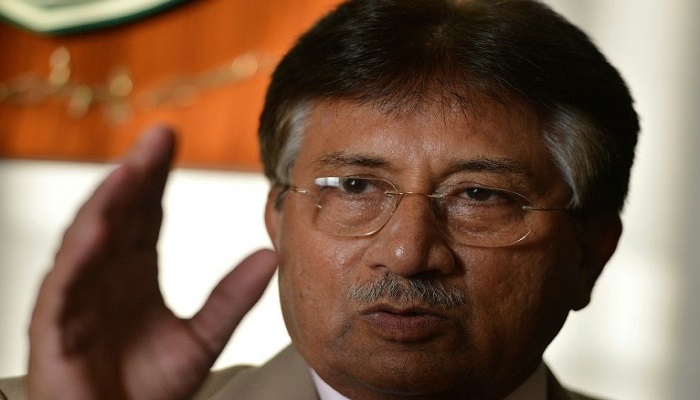Pakistan divided on legacy of military ruler Musharraf
ISLAMABAD: Pervez Musharraf was a polarising figure in Pakistani politics, returning the country to a period of economic stability while accused of rampant abuses and weakening democracy.
“Musharraf boosted education standards and infrastructure in Pakistan. He brought development to the country,” 24-year-old student Mohammad Waqas told AFP in Islamabad. “But on the other hand, the country suffered losses in the face of terrorism. Entering America’s war weakened our own country.”
Pakistan is currently undergoing yet another economic crisis, and widespread political uncertainty ahead of elections due later this year. In the face of the turmoil, some remember Musharraf with a certain fondness.
“He was a good ruler. There has not been a leader like him before and there will never be one like him again,” said 70-year-old Islamabad shopkeeper Muhammad Khan. Veteran Pakistani politician and Musharraf ally Parvez Elahi told AFP: “He was a ruler with a lot of depth, who loved hard work and he would appreciate new initiatives”.
In 2006 — at the height of their alliance — US President George W. Bush called Musharraf “a strong, forceful leader [who] has become a target of those who can’t stand the thought of moderation prevailing.” His moves to overthrow an elected government and to suspend the constitution for long periods, however, also frame his legacy.
“His one act, which will be remembered throughout history, was he violated the constitution,” retired civil servant Naeem Ul Haq Satti told AFP. “The most important thing a country has is its constitution,” the 69-year-old added.
As he faced growing pressure for democratic elections, Musharraf´s oppression of critics worsened. He suspended the constitution for a second time in 2007, rounded up thousands of opponents and sacked the chief justice, leading to widespread protests.
“General Musharraf was one of the military dictators who misruled the country by... bringing in a group of sycophants,” businessman Abdul Basit told AFP in the Balochistan provincial capital of Quetta. “People do give credit to General Musharraf for developing the country but on the other hand, like his predecessors, he played havoc,” said Basit.
-
 Jonathan Majors Set To Make Explosive Comeback To Acting After 2023 Conviction
Jonathan Majors Set To Make Explosive Comeback To Acting After 2023 Conviction -
 Next James Bond: Why Jacob Elordi May Never Get 007 Role?
Next James Bond: Why Jacob Elordi May Never Get 007 Role? -
 Maddox Drops Pitt From Surname In Credits Of Angelina Jolie’s New Film 'Couture' Despite Truce From Father's End In Legal Battle
Maddox Drops Pitt From Surname In Credits Of Angelina Jolie’s New Film 'Couture' Despite Truce From Father's End In Legal Battle -
 Burger King Launches AI Chatbot To Track Employee Politeness
Burger King Launches AI Chatbot To Track Employee Politeness -
 Andrew’s Woes Amid King Charles’ Cancer Battle Triggers Harry Into Action For ‘stiff Upper Lip’ Type Dad
Andrew’s Woes Amid King Charles’ Cancer Battle Triggers Harry Into Action For ‘stiff Upper Lip’ Type Dad -
 Experts Warn Andrew’s Legal Troubles In UK Could Be Far From Over
Experts Warn Andrew’s Legal Troubles In UK Could Be Far From Over -
 Teyana Taylor Reflects On Dreams Turning Into Reality Amid Major Score
Teyana Taylor Reflects On Dreams Turning Into Reality Amid Major Score -
 Jennifer Garner Drops Parenting Truth Bomb On Teens With Kylie Kelce: 'They're Amazing'
Jennifer Garner Drops Parenting Truth Bomb On Teens With Kylie Kelce: 'They're Amazing' -
 AI Is Creating More Security Problems Than It Solves, Report Warns
AI Is Creating More Security Problems Than It Solves, Report Warns -
 'Game Of Thrones' Prequel 'A Knight Of The Seven Kingdoms' New Ratings Mark Huge Milestone
'Game Of Thrones' Prequel 'A Knight Of The Seven Kingdoms' New Ratings Mark Huge Milestone -
 Apple Seeks To Dismiss Fraud Suit Over Siri AI, Epic Injunction
Apple Seeks To Dismiss Fraud Suit Over Siri AI, Epic Injunction -
 Delroy Lindo Explains The Crucial Role Of Musical Arts In Setting Up His Career Trajectory
Delroy Lindo Explains The Crucial Role Of Musical Arts In Setting Up His Career Trajectory -
 Timothée Chalamet Reveals How He Manages To Choose The Best Roles For Himself
Timothée Chalamet Reveals How He Manages To Choose The Best Roles For Himself -
 Princesses Beatrice, Eugenie’s Conflict Gets Exposed As Mom Fergie Takes Over The Media
Princesses Beatrice, Eugenie’s Conflict Gets Exposed As Mom Fergie Takes Over The Media -
 Kate Middleton Plays Rock-paper-scissors In The Rain
Kate Middleton Plays Rock-paper-scissors In The Rain -
 Lindsay Lohan On 'confusing' Teen Fame After 'Mean Girls': 'I Should Have Listened To My Mom And Dad'
Lindsay Lohan On 'confusing' Teen Fame After 'Mean Girls': 'I Should Have Listened To My Mom And Dad'




